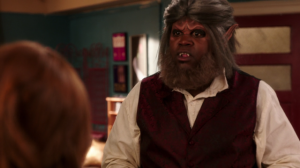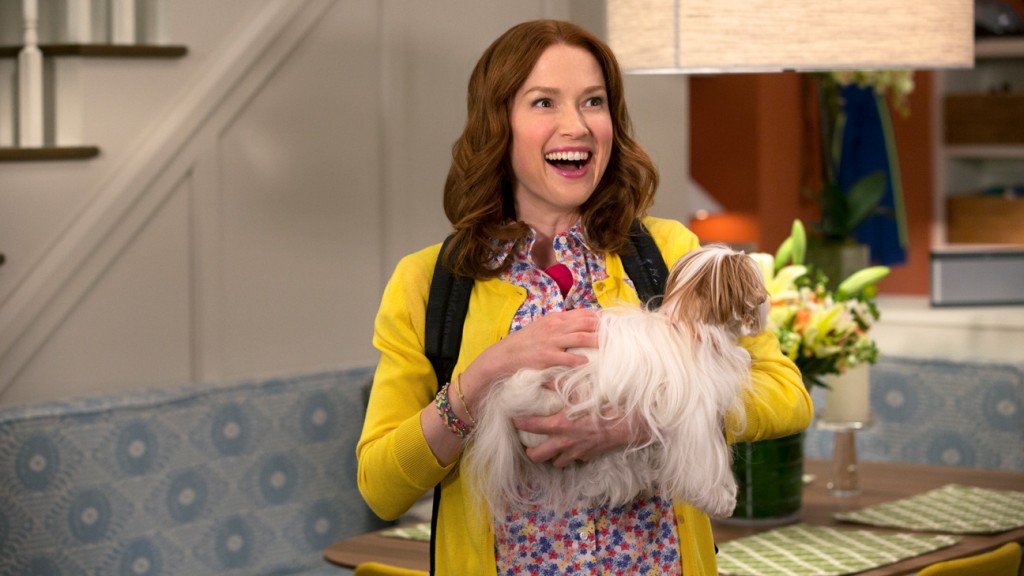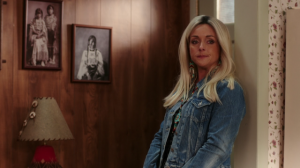Unbreakable Kimmy Schmidt is the new sitcom from the mind of comedy goddess Tina Fey (30 Rock, Saturday Night Live, Mean Girls) and her longtime collaborator Robert Carlock that was produced last year for NBC, who ended up losing the project to Netflix when the latter offered Fey and Carlock a two-season commitment. This change of venue is certainly a boon to the show, which now gets to be an anticipated seasonal binge series rather than another in the long line of brilliant network comedies languishing at the bottom of the network ratings ladder. The era of the smart one-camera comedy on network television seems to be ending (though FOX’s hit Brooklyn Nine-Nine provides some hope in that department), but between this, their acquisition of Arrested Development, and last year’s Bojack Horseman, Netflix’s comedy future is looking blindingly bright.
Unbreakable Kimmy Schmidt stars Ellie Kemper as the eponymous heroine, who is rescued after fifteen years being kept in an underground bunker by cult leader Reverend Richard Wayne Gary Wayne (secret special guest star [highlight to read] Jon Hamm). She and the three other captive women have been told that the world outside has ended, but Kimmy has never truly believed the charismatic Reverend’s story. Once she’s been set free, the eternally optimistic Kimmy tries to start a new life in New York City. There, she befriends aspiring Broadway star Titus Andromedon (Tituss Burgess), landlady/drug lookout/process server Lillian Kaushtupper (Carol Kane), and Jacqueline Vorhees (30 Rock‘s Jane Krakowski), the sociopathic wife of a mostly absent billionaire.
For fans of 30 Rock, UKS should instantly feel like home. The joke rhythm is practically identical, with rapid-fire dialogue that often makes absurd left turns and leaps of cartoon logic. Some of the characters feel a little familiar, or in the case of Jane Krakowski’s character, practically identical. Composer Jeff Richmond’s score for Unbreakable Kimmy Schmidt is so similar to his work on 30 Rock that it’s hard not to be subconsciously reminded of the old show during every scene transition. Thankfully, the actual substance of the story differs enough from its predecessor that UKS still functions brilliantly as its own animal.
Ellie Kemper is endlessly charming as Kimmy, whose contagious tenacity and optimism never comes across as neive or stupid, despite her not-quite-eighth-grade education. She works hard, she believes in herself and those around her, and is often rewarded for it. She’s a multi-faceted character with a variety of wants and needs, and she refuses to be defined by her past trauma. But most importantly, she’s funny as hell, able to rattle off cute Midwestern non-expletives like “what the ham sandwich?” in such a way that inspires laughs rather than rolls of the eye. There are a slew of running gags attached to the character of Kimmy, such as the huge gap in her historical and pop cultural knowledge for the period of her captivity, her attempts to keep her past a secret from those around her, and her continuous use of invented or misapplied vocabulary, and each of these jokes informs the character without defining her.
The same cannot be said for many of the supporting players, who, while consistently funny, haven’t demonstrated much depth in this first season. Kimmy’s roommate and best friend Titus is a scream, delivering punchline after extremely gay punchline, but rarely rises above being a rote stereotype of the flamboyantly gay stage actor that you’ve seen in countless other movies and shows. That being said, Tituss Burgess plays this character with a unique magnetism and wit that nearly makes you forgive the stereotype altogether. Carol Kane’s mischievous Lillian is a straight-up cartoon foil for Kimmy and Titus, but is honestly better that way, as the mystery of her scummy past is part of her charm.
As mentioned earlier, Jane Krakowski’s Jacqueline Vorhees is barely distinguishable from Jenna Maroney, her self-obsessed prima donna character from 30 Rock. Insecure and superficial, Jacqueline is a parody of the idle uber-rich, on paper far from Jenna the constantly failing actress, but she ends up delivering the same straight-faced jokes about plastic surgery, unusual sex acts, and the strange secret rituals of high society. This isn’t a problem, really, because she’s still incredibly funny, and because her foil is now the younger, unflappable Kimmy instead of the beleaguered Liz Lemon. It’s not that UKS is repeating 30 Rock‘s jokes, it’s just using the same toolbox, and arguably, using it even better.

I’m not going to give you context for this; you’re just going to have to watch to find out what’s going on here.
Unbreakable Kimmy Schmidt is heavy with feminist themes, as Kimmy both literally and figuratively breaks free from the boundaries set up around her by men. Reverend Richard Wayne Gary Wayne is an overtly misogynist preacher who delights in breaking down and controlling women (who are, of course, the origin of all that is sinful and bad in the world). During flashbacks to her time in the bunker, we see that Kimmy is the only one of the four captives to stand up to Reverend Wayne, and by spending her newfound freedom in the city and rejecting the notoriety of being one of the “Indiana Mole Women,” she’s sort of still standing up to him, being her own person rather than the person he tried to make her into. Kimmy tries to free other women from oppressive societal standards as well, by getting Jacqueline to stop equating her outer appearance to inner worth, and by keeping Jacqueline’s daughter and millennial caricature Xanthippe (Dylan Gelula) from pretending to be shallow and stupid in order to seem cool.
The show does place Kimmy into a love triangle, but unlike many other sitcoms with a female lead, it never becomes the main focus of the show or Kimmy’s life. Her two suitors are Dong Ngyuen (Ki Hong Lee), a Vietnamese immigrant from Kimmy’s GED class, and Logan Beekman (Adam Campbell), a charming but childish billionaire. The triangle results in some good comedy and some tasty melodrama, but it’s never what the show is about. Kimmy isn’t defined by what man she chooses to attach herself to, it’s just only part of her much larger story, a part that’s even completely back-burnered for the season’s last few episodes.
While it’s commendable that UKS puts so much work into developing this great female protagonist with agency and complexity, it’s a pity that the same effort wasn’t put into its many minority characters. While the cast features may characters of color, their ethnicities are frequently crutches for easy racial humor. For three episodes we’re treated to the same jokes at Dong’s first name, and it’s only when Kimmy (and presumably the writers) gets tired of it that she points out that Dong is a really common Vietnamese name and it’s really not all that funny. Dong helps Kimmy with her math, because of course he does. There are two named Latinas in the show, and they’re both housekeepers. One of them is Donna Maria (Sol Miranda), the only one of the four Mole Women not to have a well-defined character or arc; she just shakes her head at the weird white ladies and mutters jokes to herself in Spanish. (There are a lot of “damn, white folks are crazy” jokes in Kimmy Schmidt, including from white characters, and they nearly always land, but it’s hard to ignore how often they go to that well, especially while binge-watching.)
And then there’s the puzzling choice behind the backstory of Jacqueline Vorhees. Early on in the season, we learn that the blonde and blue-eyed Jacqueline is actually a Native American who ran away from her family to pursue the more glitzy white American lifestyle. While there are a handful of funny flashbacks featuring her parents (Gil Birmingham and Sheri Foster), Jacqueline’s story doesn’t really hinge on being Native American—the jokes would land nearly as well if she were, say, from a Florida trailer park like Jenna on 30 Rock. Casting Krakowski as Jacqueline is a no-brainer—the character was clearly tailor-made for her—but choosing to play this lilywhite actress as a Native American, given the long history of non-NAs being cast in such roles, is going out of your way to be offensive. There’s even a joke in the season’s final episode that lists “watching Mexicans play them on TV” as one of the many struggles Native Americans have faced over the generations, so it’s not as if nobody on the show was aware of what they were doing. Like 30 Rock, Kimmy Schmidt works under the logic that it’s okay to play to ethnic or gender stereotypes, as long as you hang a lampshade on it, which is a total fallacy, and reminds me of a tweet Deadshirt’s own Dominic Griffin posted during our coverage of this year’s Oscars.
Dear Oscars, SNL & every mainstream institution that jokes about how white and homogenized they are: THAT DOESN’T MAKE YOU LESS HOMOGENIZED.
— Deadshirt.net (@DeadshirtDotNet) February 23, 2015
Not one of these is a fatal flaw in the show—far from it, Unbreakable Kimmy Schmidt is, on the whole, delightful, and 100% worth your time. For all its representation foibles, this is still a show that stars three women and a gay black guy, a serious rarity on American TV. Unbreakable Kimmy Schmidt is the perfect show to fill the hole in your heart left behind after the finale of Parks and Recreation last month. It’s is a feel-good show, clever and warm and mostly original, and that NBC let this series slip from their fingers speaks volumes about how lost at sea programming has been of late. The second season of Unbreakable Kimmy Schmidt is expected this time next year, which should give you plenty of time to watch and re-watch season one, which you will do. While it’s not without its flaws, Unbreakable Kimmy Schmidt is, for this week, anyway, the funniest darn show on television, perfectly worthy of shutting yourself into your bunker basement and watching for seven hours straight.
Unbreakable Kimmy Schmidt‘s entire first season is now streaming on Netflix.




